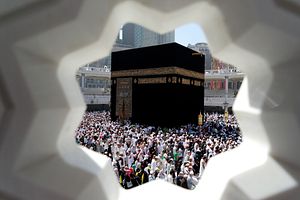Tajik religious authorities have warned citizens against believing in rumors that groups other than the state could arrange hajj travel, Asia-Plus reports. The Committee on Religious Affairs posted a statement noting a rise in rumors that those wishing to travel to Saudi Arabia on hajj this year could do so using the services of the “charitable hajj.”
Each year, Saudi Arabia welcomes millions of Muslims from abroad traveling on umrah and hajj. Hajj, one of the five pillars of Islam, is a pilgrimage to Mecca which adult Muslims must make at least one in their lifetime, provided they are physically and financially able. This year hajj will fall between September 20 and 26. Hajj is the world’s largest mass gathering, and Saudi Arabia tightly controls the number of visas issued in order to manage the sheer volume of pilgrims. In 2007, Saudi Arabia began renovating and expanding the Grand Mosque in Mecca. The construction is expected to last until 2020 and increase the mosque’s capacity to 2 million. Saudi Arabia cut the pilgrim quotas by 20 percent for foreign visitors in 2013. Previously quotas had been set for Muslim countries at about 1,000 per million people.
Tajikistan’s quota was set at 6,300 in 2014. Earlier this year, the CRA announced that it would only accept applications from citizens over the age of 35. Ostensibly this helps narrow the pool of applicants and gives older Tajiks a chance to get a spot. This move has also been seen by some as demonstrating government concerns that young Muslims may be radicalized while abroad.
Hajj is an expensive endeavor. This year, Asia-Plus reports, the hajj will cost Tajiks $3,800 and include travel, board and lodging, “special clothing with the national flag, purchase of animal for sacrificing, guide services, medical insurance, vaccinations, etc..” In 2012, the BBC reported that the average yearly wages in Tajikistan totaled $2,700, the very bottom of the International Labor Organization’s wage report that year.
Because of the quotas, travel plans must be made through agents approved by Saudi Arabia–which are able to obtain the appropriate entry visas. In some countries, these are private travel agencies. But in Tajikistan, only the CRA is able to arrange the pilgrimage. The CRA’s statement on the rumors noted that “Saudi Arabia permits only relevant official bodies to organize the Hajj; in Tajikistan, such a body is the Committee on Religious Affairs.”
Hajj scams are not uncommon around the world. In December, a travel agent in the United States was arrested by the FBI for selling hajj trips without actually having the ability to obtain such visas. Police in London even launched a Hajj fraud prevention campaign for 2015 to educate British Muslims on how to avoid being scammed. Of course, one of the pieces of advice is “do your research.” In Tajikistan this may be difficult advice to follow. In the past few years the state’s hand on the practice of Islam has tightened (remember the reports of forced beard shavings?) which may prevent the faithful from asking too many questions.

































